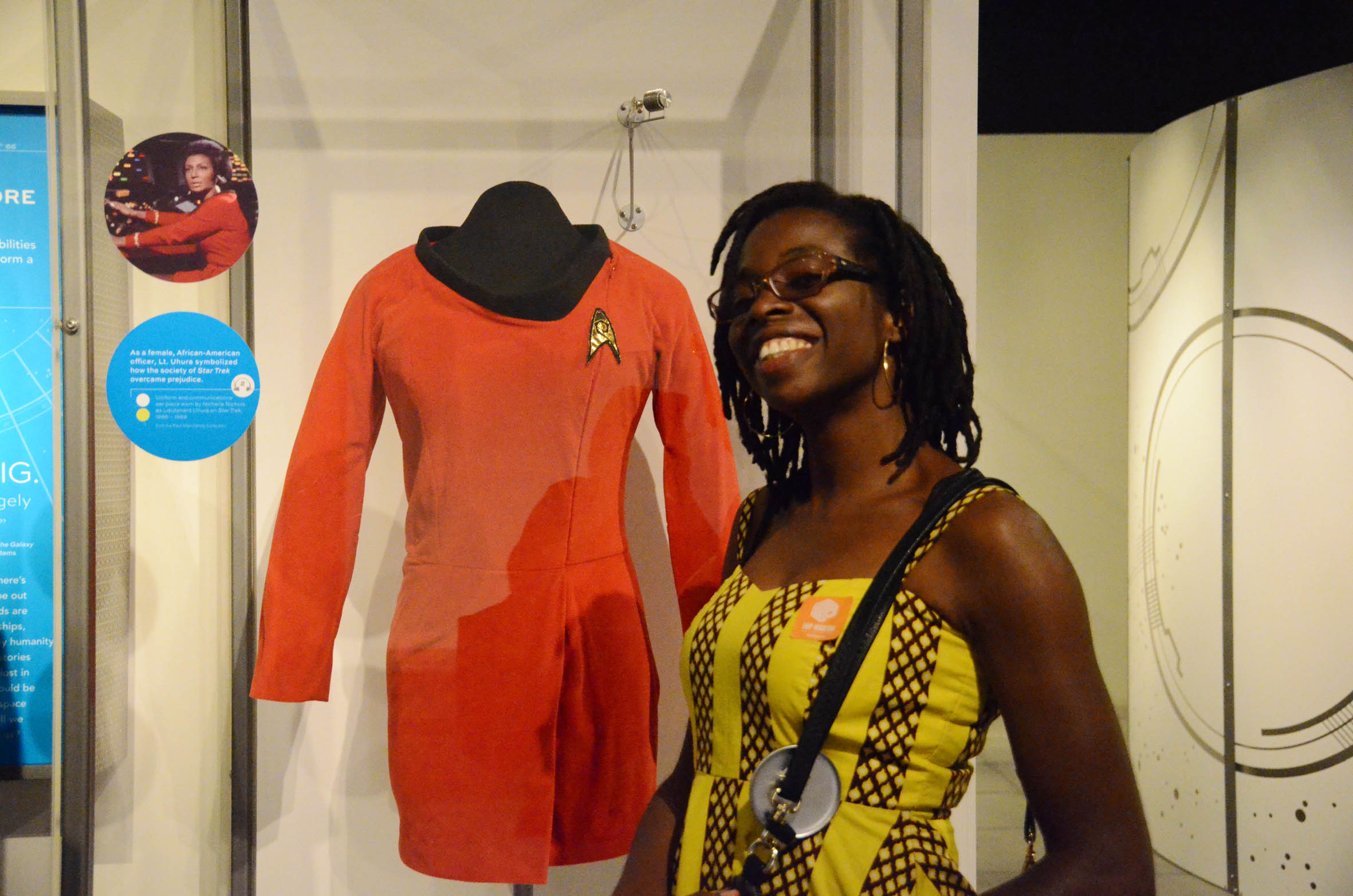By Chinelo Onwualu
For the last few weeks, I’ve been grappling with a singular question: Has African science fiction influenced African technology and design? The answer is, well: yes and no. Science fiction and science fact have always been linked to each other, and it’s no different in Africa. The problem is that there just isn’t enough home-grown scientific innovation or science fiction in film and literature to say exactly how the two influence each other. And for a lot of the same reasons.
For one thing, neither African science fiction nor African innovation are clearly defined terms.
Speculative storytelling has had a long history on the continent. However, no one has been quite sure what to call these tales. There’s certainly a difference between the kind speculative fiction written by those invested in Africa and her future, and those merely set in Africa – where the continent acts as an exotic prop or backdrop. It’s the difference between H. Rider Haggard’s King Solomon’s Mines about European adventurers in Namibia in 1885 and Amos Tutuola’s The Palm Wine Drinkard a retelling of a Yoruba folk tale written in the 1930s.
However, as academic Mark Bould notes, the term African science fiction risks homogenising a diverse continent and casting these stories as an exotic subset of a “normalised” Western form of the genre. Even Nigerian-American sci-fi author Nnedi Okorafor is wary of the term.
“How do I define African SF?” she wrote in a 2010 essay. “I don’t. I know it when I see it.”
No one is quite clear on what African scientific innovation is, either. There has been a lot of celebration of the rising numbers of young Africans at the forefront of inventive applications for the web and mobile phones. In an Okayafrica article, African-British activist, Toyin Agbetu praised these innovators saying:
“The young geeks clustered around the iHub in Nairobi and MEST in Accra have started to move the conception of Africa from victim of technology to its masters.”
But this concentration on urban tech hubs, what one article dubbed “Silicon Savannahs”, ignores the quieter forms of innovation that happen when Africans remix and repurpose existing technologies. For instance, the four Nigerian girls who found a way to run a generator on urine or the young Malawian man who built wind turbines out of spare parts are actually at the forefront of a long history African innovation, but are often praised as special cases rising improbably from obscurity.
As Agbetu rightly noted, to the average African mechanisation is not progress. Those who have seen large-scale construction projects such as hydroelectric dams stall and fail because of corruption, poor construction and shoddy maintenance are bound to view mechanisation with suspicion. They fear that it comes with extractive or exploitative processes.
Another problem is that both African science fiction and African technological innovation suffer from a lack of supporting infrastructure. In Nigeria for instance, the publishing industry is only beginning to rise from the ashes of the country’s economic meltdown in the 80s. During the industry’s golden era, books like the Pacesetters series featured stories set in alternative pasts and glittering futures. My favourite remains a high-tech thriller called Mark of the Cobra by Valentine Alily, about a James Bond-style spy working for Nigeria’s secret service and featuring a solar-powered superweapon.
These days, however, low literacy rates and the high cost of books means that the demand for literature is often poor. Though consumers buying cheap imported books and watching Hollywood sci-fi blockbusters has shown that genre fiction is highly popular, many publishers still prefer to concentrate on proven sellers such as religious materials and textbooks.
Scientific innovation has the same problem. According to a Guardian article earlier this year, Africa produces just 1.1 percent of global scientific knowledge. This is because, as commenter Benjamin Geer pointed out, science fiction is less effective in encouraging scientific innovation than simply providing funding for the sciences.
“If you want young people to become scientists, there need[s] to be well-funded degree programs and career opportunities for them,” he wrote in response to a 2010 article about the future of science fiction in Africa. “This means that states need to invest heavily in science education and scientific research.”
Perhaps the biggest problem both scientific innovation and science fiction in Africa share is that they are not often recognised for what they are.
As I said earlier, Africans have been creating their own science fiction for quite some time; only these stories often don’t have the elements we have come to expect from the genre. For instance, two icons of African speculative fiction Ben Okri’s 1991 novel The Famished Road and Wizard of the Crow written by Ngugi Wa Thiong’o in 2006 feature magic and spirits, but neither deals directly with technology.
Nigeria’s prolific film industry, Nollywood, is the third-largest in the world and frequently features stories of magic, supernatural encounters and physical transformation. But the matter-of-fact treatment of these themes within these movies means they’re often dismissed and not recognised as legitimate science fiction.
In fact, magic, surrealism and abstract poetics are big features of African sci-fi. This is because, as Ghanaian writer Johnathan Dotse explained in a 2010 essay, Africans have a fundamentally different relationship to technology than those in the West.
“The widely optimistic view of technological progress underlying traditional science fiction simply doesn’t resonate with much of the experience on the continent,” he wrote.
Only recently – in the last decade or so – has there been a true groundswell of science fiction written by Africans for a primarily African audience. Most of this sci-fi doesn’t deal with the mechanics of scientific innovation, though. Stories tend to focus on the social costs of progress. Two recent African science fiction anthologies, AfroSF edited by Zimbabwean author Ivor Hartmann and Lagos 2060 edited by Nigerian Ayodele Arigbabu, have a diverse range of stories that could be considered firmly speculative, however, this is not the place to find the kind of explorations of hard science that Isaac Asimov and Larry Niven wrote.
This has led some to speculate that right now, technology is influencing African science fiction more than the other way around. In a series of social media chats in November, science fiction author and academic Geoffrey Ryman noted that sci-fi writers on the continent tend to have great ideas for science fiction stories, but not necessarily for scientific innovations.
“Technology contributes to SF and not the other way around,” he wrote. “Even Arthur C. Clarke’s geostationary satellite appeared in a science FACT article he wrote. SF can sometimes promote interest in science among the young that bears later fruit. But trying to justify SF on those grounds is dodgy. It’s a literature and an entertainment and THAT is its justification.”
Nigerian writer and engineer Wole Talabi has hope, however, that this currently one-sided relationship will right itself. In an upcoming essay, he presents evidence that shows that the influence of science fiction often takes about 15 to 20 years to show up in scientific innovation.
“You need to be able to imagine the future before you can begin to create it,” he wrote.
Author Biram Mboob believes this influence goes beyond just sparking new ideas. African science fiction can change the very orientation people might have towards the future.
“I would make the argument that SF will either ‘reinforce’ or perhaps challenge our ‘mood’ about the future,” he wrote in a Facebook chat last year.
I have to agree. In my work as a writer and editor of African science fiction over the last five years, I have noticed an emerging optimism. Africans are moving away from their justified suspicion and mistrust of large-scale innovation. More African writers are imagining unique utopias – their countries and cities improved by technology that works with their societies rather than ruined by it.
For instance, in the most recent edition of Omenana, which I co-edit, 10 writers and artists shared their vision of African cities of the future. Almost all of them had themes of hope and possibility. More than anything, inspiring the creators of the future is where I believe the intersection of African science fiction and science is clearest.
“Inspiration, ideas, they flow both ways,” wrote Talabi in a Facebook chat last year. “But for that you need a critical mass of technology, industry, popular science, SF creators and publishers, and organised fandoms before you begin to see and quantify the impact.”


I agree with most of what has been said here. However, I believe that even the African perception of what technology is and what it is likely to be needs to include more than only the Westernized approach.
Our understanding of the capabilities and the possibilities of science must start to feature uniquely African ideas if we hope to improve our relationship with technology enough to see its future in our future.
There are close to 3 million patent applications filed and 2.5 million scientific papers published each year. How much credit can fiction writers take for all that activity? My guess is very little. Although some scientists claim to have been influenced by speculative fiction, few breakthroughs would have been significantly delayed if the work that “inspired” them had never been written or filmed.
It’s also possible that, in some fields, (dytsopian) sci-fi may have a negative effect on science, or at least on the social climate in which scientific research is funded and carried out. The movies tell us, and sections of the public believe, that genetic engineering breeds monsters, artificial intelligence leads to Skynet and human cloning produces disposable workers, slave armies and Brave New World. These spectres perennially haunt public discussions on the future of technology. Attempts to banish them waste resources that could be better spent elsewhere.
[…] Chinelo Onwualu: African Science Fiction and Literature […]
My name is Augustine Ogwu. I am a Mechanical Engineering graduate and have been writing science fiction from my mid-twenties during my university days. I create alien worlds in deep space with some human characters. One of my novels, Moon Rider, was set in deep space with many interesting alien characters. I have also written a collection of SF short stories. Moon Spell is one of the short stories set in the eastern part of Nigeria. I am really creative and now in my early forties. How do I get my books published?
[…] AFRICAN SCIENCE FICTION AND LITERATURE […]
[…] Chinelo Onwualu, Omenana, traduzione di Marella Fasano per […]